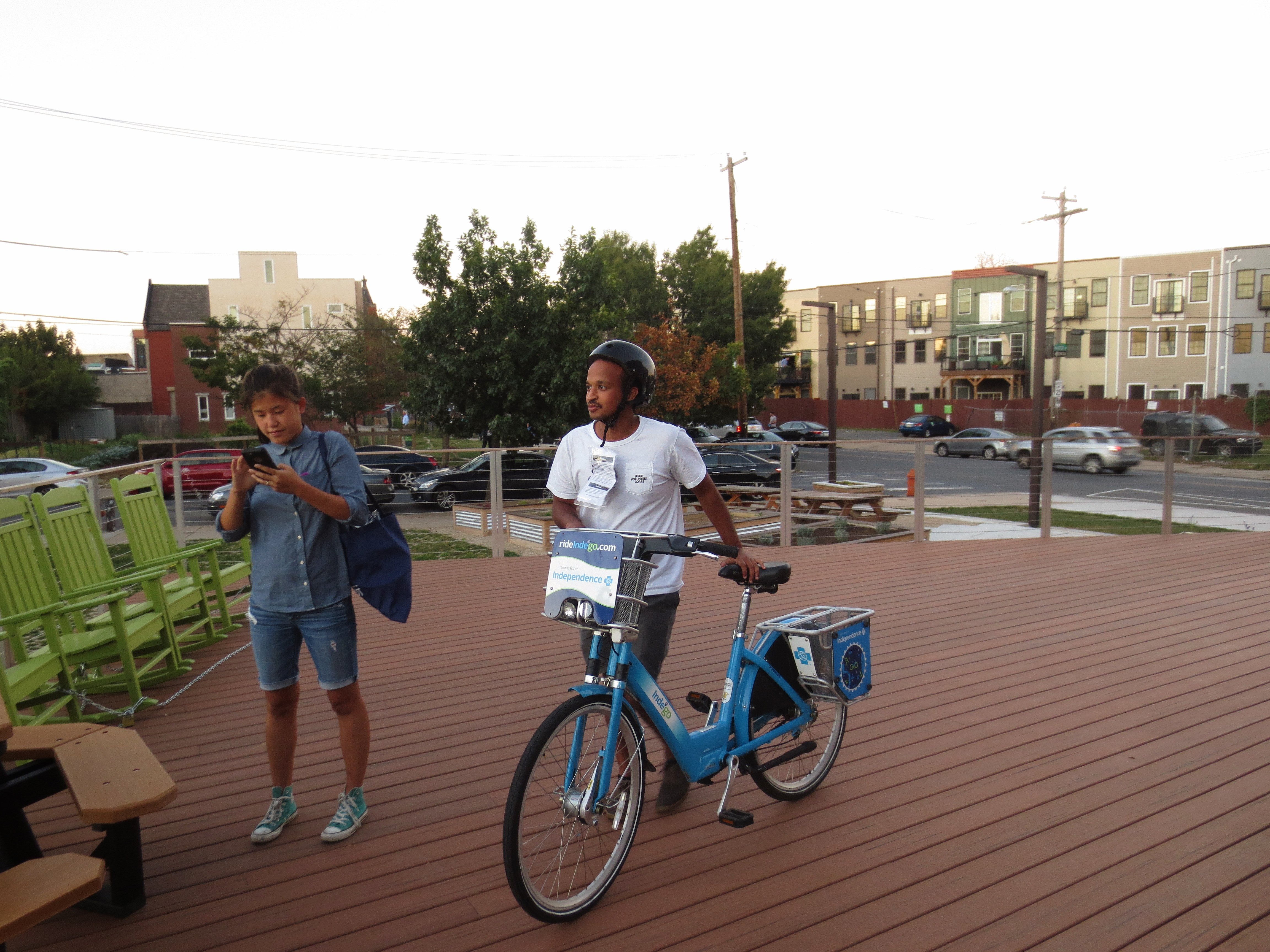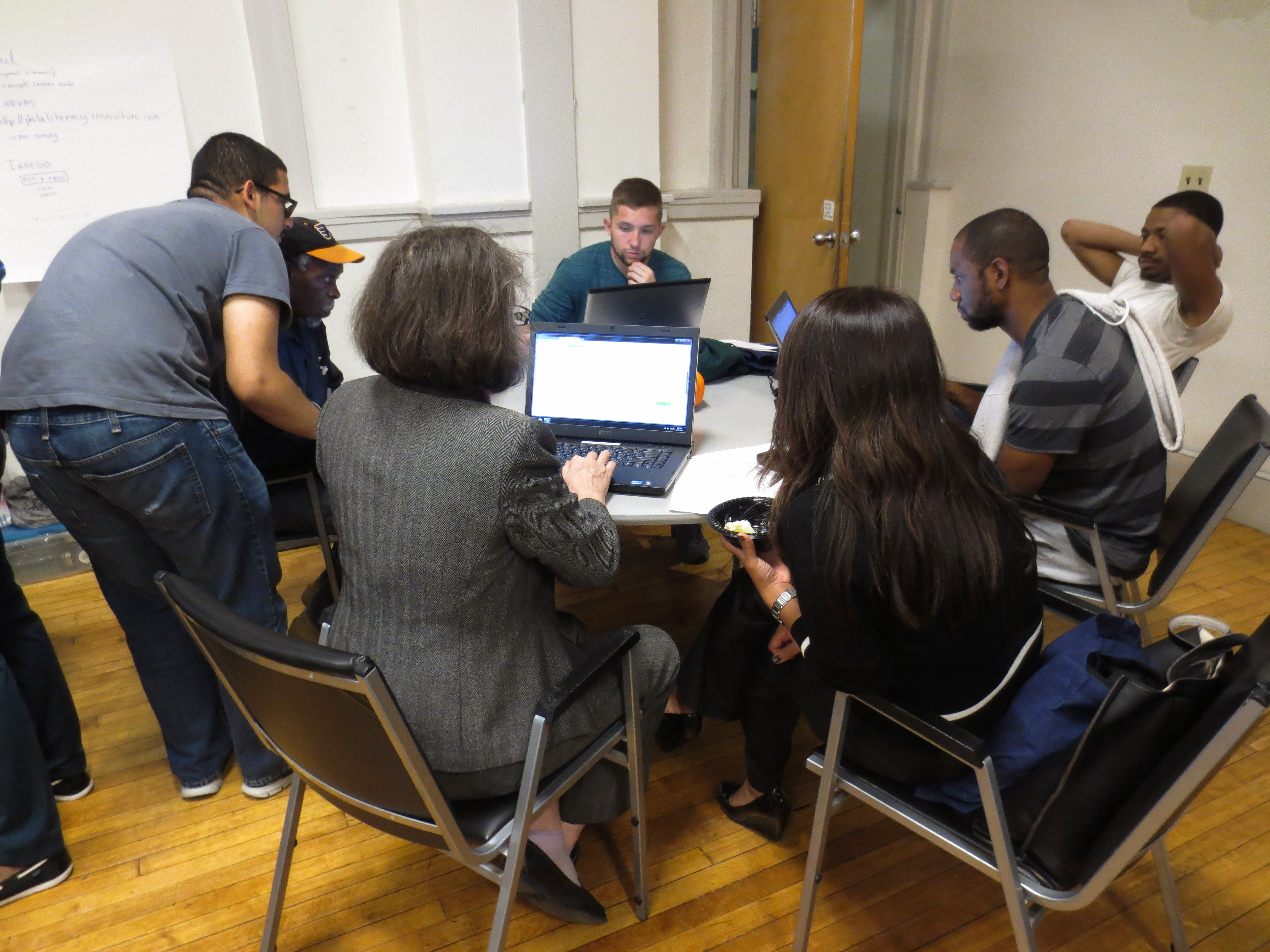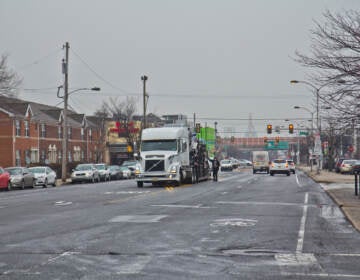Indego meets Internet literacy in course helping adults learn both

As Jennifer Kobrin, Program Manager at the Office of Adult Education, led the orientation of the third cohort of the Digital Skills and Bicycle Thrills (DSBT) program, she explained to a roomful of people at Lutheran Settlement House that they should get ready to “bike all over Philly and use cool apps.” Those promises could seem daunting for those who might have never mounted a bike or turned on a computer.
But for others, like 46-year-old Brenda Vera, who lives in Feltonville, the program appeals to two of her personal goals. “I need to brush up on computer skills and do some exercise, so free bike riding sounds good to me,” she said.
A partnership among the Office of Innovation and Technology, the Office of Transportation and Infrastructure Systems, the Bicycle Coalition of Greater Philadelphia, Office of Adult Education, and the Better Bike Share Partnership, DSBT is a four-week online and in-person digital literacy class that focuses on the topic of bicycle safety. Participants get a one-month Indego bike share pass during the course, and those who complete it get a 6-month pass. Assignments include using Google Maps to plan a bike route from home to work; downloading a Word Doc with a writing prompt and then uploading the answer; and opening a video on hand signals with the expectation to try those out on the bike. In addition to the online course component, participants can receive individual help with computer assignments and come together for group bike rides. The orientations take place at KEYSPOTS, where participants can access computers and the Internet, should they not have either at home.
Carniesha Kwashie, the Better Bike Share Partnership Grant Manager, conceived of the DSBT program in order to address challenges and doubts that many Philadelphians might have about using Indego: “Is this for me? Do I know how to use the Internet? Does my neighborhood have bike infrastructure so I can feel safe riding?” she said.
DSBT aims to increase participants’ comfort using digital tools to improve literacy levels and as a way to lower the barrier to accessing Indego, since sign-ups are online. If the initial barrier is lowered, the hope is that Indego will see a more diverse ridership made up of cyclists of varied ages, socioeconomic levels, races, and neighborhoods. Knowing how to bike safely in a city and understanding digital tools can both lead to self-sufficiency.

The program’s first two cohorts, which began in April and June, were funded initially by the Office of Innovation and Technology’s Innovation Fund—which awards seed funding (in this case, $15,000) to experimental pilot programs—as well as the Better Bike Share Partnership, which provides funding support with the aim of making Indego a more equitable system. The DSBT course development and facilitation cost $11,000 from the Innovation Fund’s grant (the remaining seed funding will go towards subsequent cohorts), and catering for orientation and graduation cost $1,092 from the Office of Adult Education. The Better Bike Share Partnership provided funds for one helmet per participant ($720 total); Indego swag such as sunglasses, water bottles, and bags ($1,125 total); and Indego Bike Share passes ($5,175).
In the first cohort, 24 people participated with an average of 50 rides per person during the four weeks of the course. In the second cohort, the 22 participants showed an average of 67 rides per person. In each cohort, 14 participants graduated for an average completion rate of just over 60 percent per course.
The participants represent demographics Indego is looking to attract, including people who were formerly incarcerated and currently experiencing homelessness. In both cohorts, 63 percent of participants were older than age 40, and people of color accounted for 75.5 percent of participants. In terms of education level, those who did not finish high school or received a high school diploma or GED accounted for 53 percent of participants between the two cohorts. Between the two cohorts, 38.5 percent of participants were unemployed, and 51.5 percent of participants reported an income of $20,000 or less per year.
Because only two thirds of the pilot cohorts have completed the program, ridership trends among participants haven’t been analyzed yet, said Kwashie. Defining what accounts for success—the number of Indego rides a participant takes after graduating, the length of a ride, or how long a participant retains her Indego membership—is still up in the air, but Kwashie wants to see participants engaged with Indego throughout their complimentary six-month membership and show evidence of improving their digital know-how by using the Indego app and logging on to social media platforms. Anecdotal evidence and testimonies from past and current participants indicate positive effects of the program in regards to biking and digital literacy.
Kobrin recounted one participant who took three hours to set up his email account, but ended up passing the course with a 90 percent score. She also mentioned a woman who signed up for Facebook using what she’d learned in the course and reconnected with a sister she hadn’t been in touch with in six years.
Emily Philips, from the first cohort, said that the course allowed her to “understand better how apps work and how to make them work for myself. I can identify the appropriate app for my needs.” Plus, the bike safety component of the course taught her how to protect herself on the road, which “gave me the oomph I needed to explore the city more.”
Almost half of participants in the first cohort reported feeling uncomfortable or very comfortable in using a web browser and the Internet, and at the end, 99 percent reported that they felt their digital skills had improved thanks to DSBT. (Those numbers were 32 percent and 100 percent, respectively, for the second cohort.) And by the end of the course, 80 percent of participants in the first cohort reported feeling comfortable or very comfortable riding a bike in Philadelphia—87 percent reported as such in the second cohort.
Waffiyyah Murray, Education Program Manager at the Bicycle Coalition of Greater Philadelphia, who leads group rides for DSBT, has recognized a difference in participants over the course of the program. “At the graduation, we have so many people come up and say how convenient Indego was,” she said. “Some of them exchanged numbers and were planning to do group rides together.
It is too early to determine the long-term impact of the Digital Skills and Bicycle Thrills—economically, on Indego’s ridership, and otherwise—so the measurable return on the $19,112 investment is unknown. However, based on the consistent 60 percent completion rate and diverse set of participants, the program has earned sustaining funding for at least three more cohorts over the next year. These subsequent cohorts will fine-tune the program and its curriculum based on the pilot.
WHYY is your source for fact-based, in-depth journalism and information. As a nonprofit organization, we rely on financial support from readers like you. Please give today.





